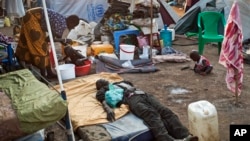GENEVA —
The medical aid group Médecins Sans Frontières, or Doctors Without Borders is urging humanitarian agencies to speed up emergency assistance to South Sudan before the rainy season gets fully underway and roads become flooded and impassable.
Doctors Without Borders Director GeneraL Bruno Jochum has returned from a visit to South Sudan. He says aid agencies are racing against time to pre-position stocks of relief supplies before the rains come. He worries they may be losing the race.
He blames much of this problem on rigid bureaucracies in the United Nations, various governments and donors' organizations. He says these systems are excessively slow in assessing needs and distributing funds, and that it takes most organizations three to five months to get the money they are promised.
Jochum says aid agencies need the money now, while they still have access to people in need.
Fortunately, he says, there are no political obstacles to disbursing aid in South Sudan because government and opposition forces are giving aid groups free access to all areas.
But he says the security situation puts many areas out of reach.
“You have probably close to one million people who are missing the planting season, who have left with their belongings and who will not be able to harvest in a few months from now. So, they will be very dependent on not only food assistance, but, relief in general. It is quite critical for both stocks, logistics and emergency programs to be put in place to respond to this challenge in a few months down the line," said Jochum.
Doctors Without Borders runs a large operation in South Sudan. It has 340 international staff and 20 projects, eight of which have started since fighting broke out between the government and rebels in mid-December.
During his recent visit to South Sudan, Jochum says, he saw that several of his organization’s structures had been severely looted, or damaged or nearly destroyed. In some cases, he says field teams had to be evacuated.
Despite these circumstances, Jochum says his organization is continuing to provide critical health services for thousands of victims of this war.
“Since early December, we have been taking in charge about 2,000 wounded in different locations and providing health care-whether hospital care or primary health care to both new displaced population, refugees going outside the country in Ethiopia and Northern Uganda, but also giving care to, as I said, victims of violence," he said.
Jochum says he is concerned by a growing suspicion by different parties toward the U.N. Mission in South Sudan. He says most aid agencies are dependent on U.N. logistics to carry out their humanitarian duties. He warns agencies may face risks in the coming months, if suspicion toward UNMISS continues to grow and it comes under attack.
Doctors Without Borders Director GeneraL Bruno Jochum has returned from a visit to South Sudan. He says aid agencies are racing against time to pre-position stocks of relief supplies before the rains come. He worries they may be losing the race.
He blames much of this problem on rigid bureaucracies in the United Nations, various governments and donors' organizations. He says these systems are excessively slow in assessing needs and distributing funds, and that it takes most organizations three to five months to get the money they are promised.
Jochum says aid agencies need the money now, while they still have access to people in need.
Fortunately, he says, there are no political obstacles to disbursing aid in South Sudan because government and opposition forces are giving aid groups free access to all areas.
But he says the security situation puts many areas out of reach.
“You have probably close to one million people who are missing the planting season, who have left with their belongings and who will not be able to harvest in a few months from now. So, they will be very dependent on not only food assistance, but, relief in general. It is quite critical for both stocks, logistics and emergency programs to be put in place to respond to this challenge in a few months down the line," said Jochum.
Doctors Without Borders runs a large operation in South Sudan. It has 340 international staff and 20 projects, eight of which have started since fighting broke out between the government and rebels in mid-December.
During his recent visit to South Sudan, Jochum says, he saw that several of his organization’s structures had been severely looted, or damaged or nearly destroyed. In some cases, he says field teams had to be evacuated.
Despite these circumstances, Jochum says his organization is continuing to provide critical health services for thousands of victims of this war.
“Since early December, we have been taking in charge about 2,000 wounded in different locations and providing health care-whether hospital care or primary health care to both new displaced population, refugees going outside the country in Ethiopia and Northern Uganda, but also giving care to, as I said, victims of violence," he said.
Jochum says he is concerned by a growing suspicion by different parties toward the U.N. Mission in South Sudan. He says most aid agencies are dependent on U.N. logistics to carry out their humanitarian duties. He warns agencies may face risks in the coming months, if suspicion toward UNMISS continues to grow and it comes under attack.




